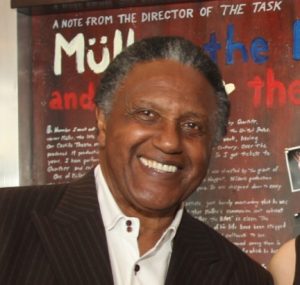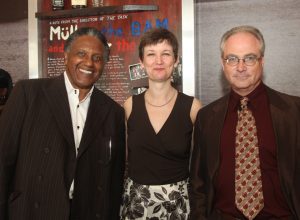
 Charles Weldon, a veteran actor of stage, film, and television, is known for the memorable roles he created in "Stir Crazy", "The River Niger", "A Soldier's Play", and "New York Undercover" -- among many, many others. He has also been a member of the Negro Ensemble Company since 1970, where he is now Artistic Director. I recently had the opportunity to talk with this living legend about his career, why he stays in the business, and his experiences directing Fred Newman's "Stealin' Home" -- a play about Jackie Robinson, now playing at the Castillo Theater.
Charles Weldon, a veteran actor of stage, film, and television, is known for the memorable roles he created in "Stir Crazy", "The River Niger", "A Soldier's Play", and "New York Undercover" -- among many, many others. He has also been a member of the Negro Ensemble Company since 1970, where he is now Artistic Director. I recently had the opportunity to talk with this living legend about his career, why he stays in the business, and his experiences directing Fred Newman's "Stealin' Home" -- a play about Jackie Robinson, now playing at the Castillo Theater.
StageBuddy: Where did you start in the industry?
Charles Weldon: I started in this industry in high school, and by the time I was 18 I had the number one song ["Diamonds and Pearls"] in the country -- [that was in the] early 60s. And that was all by luck, you know what I'm saying. Just luck. I mean, even when we recorded the song, we went to LA with the band [The Paradons]: the band had the recording session, but we sang with them periodically at different dances around my little hometown, and they said: "Listen: if we have any time after we finish you guys can lay down some songs." And we went to LA, and we laid down four songs, and one of the songs was "Diamonds and Pearls" -- and it became a big hit in the early days. I couldn't even sign a contract back then: I was 18 years old.
How did acting come about?
Time passed and I was working with four white boys. We called ourselves 'Blues for Sale' and we worked what we called 'Blue-Eyed Soul Clubs' because that was where you really made your money in the Disco days. I was in San Francisco, and my sister worked with Bill Ball at the American Conservatory at Geary Theater; I use to borrow her car sometimes and I'd have to pick her up, and she would be in rehearsals for all these plays and I use to sit there and wait for her but I never thought about being an actor -- just waiting to give her car back.
But then she introduced me to these guys that started a theater group: they had a group called Dialogue Black and White, and the first play they had was a musical by Oscar Brown, Jr. He wrote the music to this play called "Buck White" -- at the time it was called "Big Time Buck White". [Weldon sings a bit of the tune.] I auditioned. I didn't get the job, but he needed somebody to do whatever so I understudied it, and I ran the lights...I did everything. I was like the gopher. That's where I started learning how to be an actor. Then they had auditions for "Hair" and I got the part; I'd been an actor every bit of three months and I was at the Geary Theater doing "Hair". We had the best cast, too; I use to tell people we came to work dressed -- we were flower children at that time. I was in "Hair" for about two or three months, and Oscar called me one night and he said "Charles, you want to go to Broadway?" and I thought he was talking about North Beach and he goes, "Naw, naw, naw, I'm talking Broadway, New York. We're going to take 'Big Time Buck White' to Broadway" -- because Mohammed Ali was going to play the lead character. That's what got me to New York. I'd been an actor every bit of nine months, and I was on Broadway.
What is "Stealin' Home" really about?
This play is not about baseball: it's about a baseball player. The play is about human beings...how this man [Jackie Robinson] related away from the baseball diamond. It's about what Fred Newman calls the quiet times: times at a restaurant, times at a bar; it's about what Fred Newman imagined what these two people [Pee Wee and Robinson] would talk about. Everyone wanted to make Jackie Robinson this person who could do no wrong. It's about what Fred Newman thought this man was like when he wasn't on the field.
What's your experience working at Castillo been like?
This place is probably the best place for a director to work, because they got everything together. All I had to do was come in to work with the actors; I had time to teach. Everything else was there for me. Everything. In regards to the set, I just said "this is my idea," and a week later they sent me a picture and I said: "Well. That's my idea." Unlike a lot of theaters where you have to haggle and stuff, everything was right there for me. This would be the mecca for someone to come and try their trade. It makes it easier.
What are rehearsals like?
I try to make rehearsals fun. I'm not one of those directors that takes an actor off to the side and whispers in their ear. I'm open. I have everyone sit down and give everyone notes together so everyone knows who's doing what.
What would you say is a challenge and accomplishment in directing this particular play?
The challenge was basically to make an interesting play out of mostly dialogue. There isn't a lot of action and you have to be careful about that. I'm [also] working with....not to anything from the actors, but they were not necessarily groomed -- the two male actors were kind of beginners. So I had to teach, as well. I know I drove them crazy, but I get the rewards now cause they realize what I was trying to tell them. You can't stop at every period because if you stop you have to start all over again. They got it though. The accomplishment is what I saw today, seeing them very comfortable on that stage.
If "Stealin' Home" was a song, what would it be?
"Things That I Used to Do" -- an old blues song. First thing I thought about when I was thinking of the theme of this play. When I was 12 or 14 years old my favorite person was my Aunt Natty, and she drank her beer and talked shit and she loved the blues -- and that was the first time I heard that song. Guitar Slim. I remember my aunt listening to that song. If it was a modern song it would be Marvin Gaye's "What's going on?"
What advice would you give to an aspiring director?
The only advice I would give is the same to an aspiring actor. Make sure this is something you enjoy. I know it's cliche, but when I come to work I'm loving it. I'm looking forward to going there. If you feel good going to direct, then that's what you do. You got to love what you do. If you don't like what you do, then you shouldn't do it -- that's in anything. If I had a job paying me good money but I dreaded getting up and doing it, I would get old quick. I think that's why people get old quick, they're doing something they don't want to do.
What's next on your lineup?
You know, what I always say to people in this business, I go: "What is an actor's job?" And they'll go, "To learn your lines, be on time, etcetera," and I go: "No." They'll come up with more answers, and I'll tell them, "An actor's job is to get a job." 'Cause no job last forever.
I do have a theater company that's an everyday job. Sometimes I wake up and I'll go, "Why the hell am I doing this?" I'll be in my office and some kid like you will come through the door, and they'll see all the pictures and see all the people that came through this place at one time and I'll say: "Oh. That's why I'm doing it." I'm trying to keep a place alive that birth me. That's what I'm doing everyday. Holding on to a fantastic place. The hard part is the greats have moved on to the great stage in the sky, the people that taught me.
I always tell people this story: I remember I was out in LA -- I had just made a few movies and was hanging out with Richard Pryor and partying. And I went to the market to get liquor to take back to the party, and I was walking back around seven in the morning and I heard this voice calling my name. It was Esther Rolle. I said, "Esther!" And we hugged, and she took me by the collar and pushed me back and looked me in my eye and said, "Charles you don't look good." I laughed, because I thought I looked pretty good, but that stayed in my mind. Because that's who we were -- we were a family. She told me right to my face. Every time I would lean too far that voice would come in my head. That's why I hold on to the Negro Ensemble Company.
(This interview has been edited and condensed.)